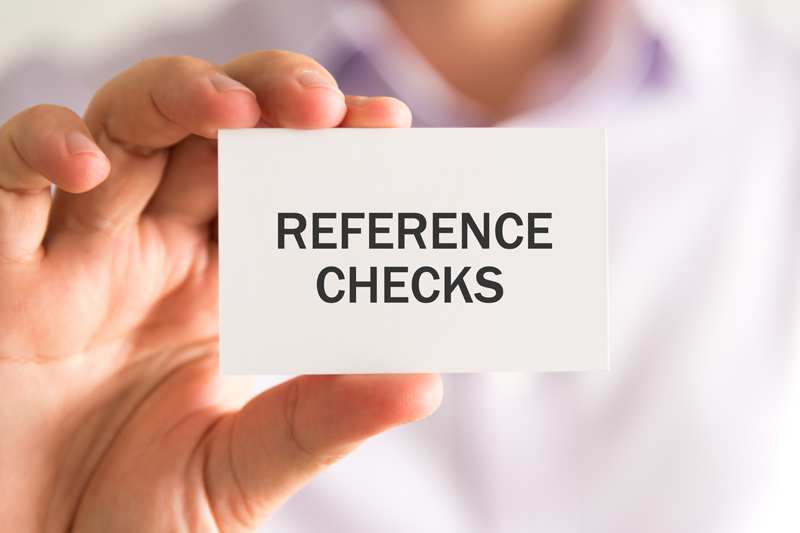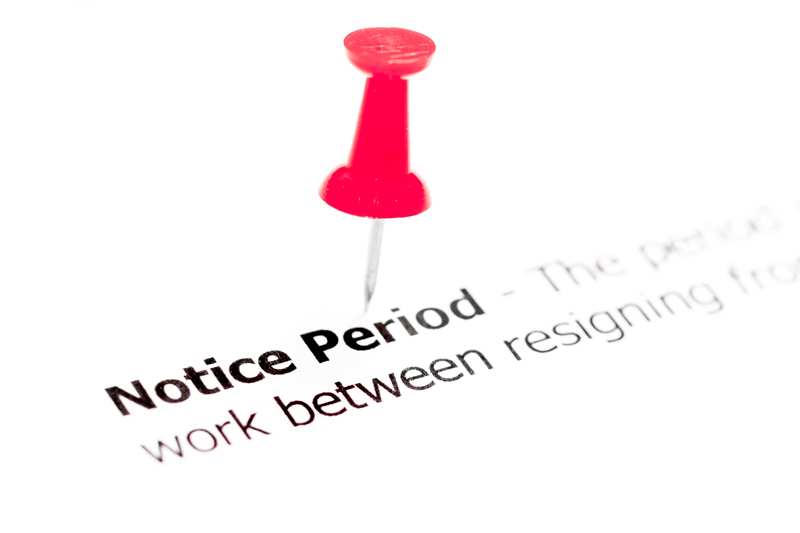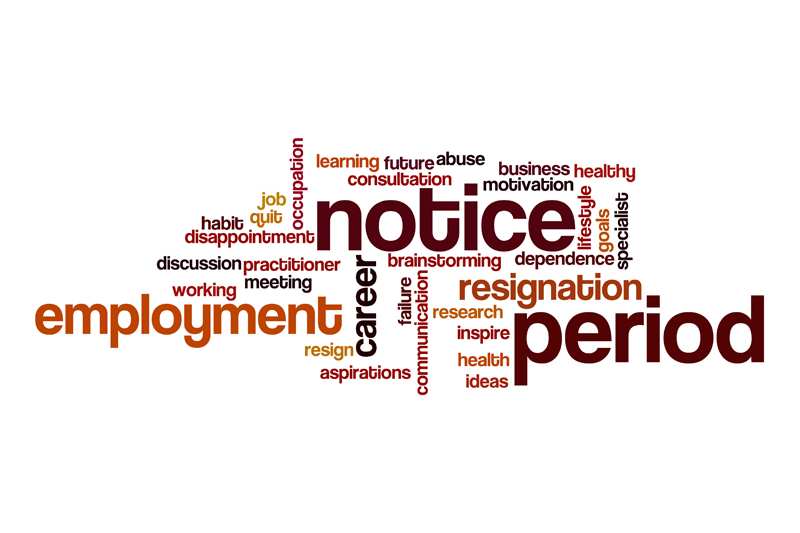
If you are wondering how to give notice the right way, this article will reveal how much notice to give and what is the right way to do so. It will make your upcoming career move to a new law firm a much smoother and more enjoyable experience.
Who in the Law Firm You Should Give Notice to?

Firstly, you should always give formal notice to the head of your department or your direct superior. That is usually a letter of resignation where you shortly announce that you are leaving and from what date your current firm should not count on you. It should be delivered in person.
Afterward, you should make sure you notify every attorney you currently work with or work for of your departure before they hear it from someone else. Those you have collaborated closely with could feel hurt or left out if you were not the person telling them that you are leaving. If you have close mentors or attorneys you have close professional relationships with, you can also thank them for helping you in your career. You want to make sure that they know how important they are for you not only professionally but also on a personal level and that you plan on staying in touch with them even though you will not see each other in the office every day.
If you really struggle with giving notice and do not know how to approach it, you can also ask someone more experienced in the law firm about how to do it. This would be preferably a partner because they know the general notice requirements the firm has for their lawyers. They will warn you about anything the firm requires that is out of the norm or that you would not think of. News, especially those about someone leaving the law firm, travel extremely fast. You do not want to underestimate anything and then leave on a negative note.
Securing References

One of the main tasks when you are leaving a firm, apart from giving notice to the employer, is also securing positive references or the promise of future references once you will need them. You should always try to leave on a positive note and ensure that the firm and firm's attorneys have a good opinion of you. The best thing you can do is to approach a partner or another senior attorney you have a great relationship with and who knows the high quality of your work and get a firm commitment from them that they will provide a great reference for you. The way you approach them depends on the nature of your relationship. If you are used to talking quite informally with them, this conversation can be very informal. On the other hand, if your relationship is formal, you should not change that when asking for a reference. In both situations, however, you should express what they mean for you and your career, how thankful you are to them for helping you grow, and that you leaving the firm has nothing to do with them. You can be sure that after this, you will have terrific references and any prospective future employer will love to read.
Of course, things happen and there might also be attorneys in your law firm with who you might not have positive relationships. Sometimes, you might feel unfavorably toward the whole law firm. If this is your case, you should still try to leave the firm in a good light. You should never say anything negative about your current firm or attorneys there, even if they have wronged you. You never know whether your prospective employer knows your current one and will ask about you or when you will need a good reference. Burning bridges is never the way to go, especially in a profession when a lot of your success depends on networking. People cultivate potential references for a reason, so even if you have worked with someone you do not want to meet ever again, do not do anything you might regret later.
How Much Notice Should You Give?

Leaving a firm abruptly can leave it in a lot of trouble and, more importantly, can leave its clients who really need a proper and adequate representation without it. To avoid that, you should always leave a firm with at least two weeks' notice. That leaves the firm enough time to find a replacement for you and ensure that the clients receive the legal services they expect and are paying for.
Of course, every attorney's situation is different. If your present firm is in a very busy period with a lot of work, giving them more time is preferable as only two weeks' notice might not be enough. This will also strengthen your employer's good opinion of you.
There are very few exceptions in which it is okay to give notice that is shorter than two weeks. If your current employer does not have work for you and it has been like that for some time, shorter notice might be okay. However, you have to be prepared that if the firm suddenly gets more work than the remaining attorneys are able to handle, the employer might need you back for those entire two weeks.
This is not as common, however, if your next position is as an in-house counsel, your previous law firm might still be able to have you as an outside counsel (if you have the authority). In that case, the notice can be much shorter and the firm will be happy to send you on.
When Is the Best Time To Give Notice?

You should always give notice the moment you have accepted a firm offer. Giving notice prematurely before every condition is met can really backfire if something does not pan out and waiting for the last moment can put your current firm in trouble in case they cannot find a lawyer to replace you.
Some established law firms require references also from the present employer of a candidate they are seriously considering. In that case, your firm will find out about your intention to leave before you have a secure offer. The best scenario would be to find someone in your current firm who is able to provide a reference that you are an outstanding lawyer. In such a case, you can confidently give notice to your firm because you know that nothing is standing in your way on the next step of your legal career.
If you are not sure if someone would be willing to write you a good reference or you know that your employer will write an unfavorable or mediocre reference, the situation is a bit more tricky. The best thing to do is to explain your situation to your potential new law firm. If the bad blood is not a result of your poor work, most employers will understand that sometimes people just do not click. You can also not mention anything and hope that your future employer will not want a reference from your current firm. However, you might be putting yourself in an unfavorable situation if it comes up.
Saying Goodbye the Right Way

During your last days in the firm, it is always preferable to say goodbye in person to everyone you have personally worked with during your time in the law firm. When you part with everyone personally and with a smile on your face, it will be the way they will remember you and it might make them help forget about any mishaps you might have made in your work. Although it is a standard practice in the legal profession, it is a nice gesture everyone will appreciate and it will make you look good. As I already mentioned, most of the attorneys you know from your past employers and other law firms can become part of your network and the tight legal community likes to stay in touch and help each other when they can. Giving notice and departing the right way is essential for keeping it that way.
Another part of saying goodbye when leaving a firm is also sending out a departing email. It is not absolutely necessary but it can be a nice gesture if done appropriately. Departing emails should never be used to air out any injustices or negative experiences you have endured in the firm. Those should be left to exit interviews. These emails are for thanking everyone for the training and experience you have gained in the firm, encouraging them to continue working hard, and providing forwarding information in case someone wants to contact you. You can pinpoint just a few people to thank; however, you should be cautious about that not to insult anyone. Departing emails should make the remaining attorneys in the law firm remember you in a positive light and even if you were not friends with everyone, they should feel like you have a decent professional relationship together.
Conclusions
Many attorneys are dreading the moment they will have to give notice to their current firm; however, something like this should not take away your excitement about starting the next chapter of your career. Learning how to give notice the right way can make this process painless and it can set you up for getting great references and growing your network. Whatever the requirements of your firm are for giving notice, you should always stay cordial and avoid saying negative things about the firm or attorneys working there. You never know when you will meet these people again and under what circumstances.
If you really struggle with giving notice and do not know how to approach it, you can always turn to legal recruiters at BCG Attorney Search who have extensive experience in helping attorneys depart their firm in the best way possible.

